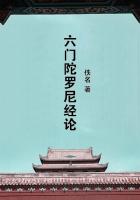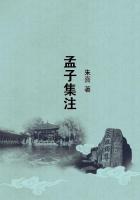The first wish of Virgil (as you will find anon by his verses), was to be a good philosopher; the second, a good husbandman; and God (whom he seemed to understand better than most of the most learned heathens) dealt with him just as he did with Solomon: because he prayed for wisdom in the first place, he added all things else which were subordinately to be desired. He made him one of the best philosophers, and best husbandmen, and to adorn and communicate both those faculties, the best poet. He made him, besides all this, a rich man, and a man who desired to be no richer, O fortunatas nimium et bona qui sua novit. To be a husbandman, is but a retreat from the city; to be a philosopher, from the world; or rather, a retreat from the world, as it is Man's--into the world, as it is God's. But since Nature denies to most men the capacity or appetite, and Fortune allows but to a very few the opportunities or possibility, of applying themselves wholly to philosophy, the best mixture of human affairs that we can make are the employments of a country life. It is, as Columella calls it, Res sine dubitatione proxima et quasi consanguinea sapientiae, the nearest neighbour, or rather next in kindred to Philosophy. Varro says the principles of it are the same which Ennius made to be the principles of all nature; earth, water, air, and the sun. It does certainly comprehend more parts of philosophy than any one profession, art, or science in the world besides; and, therefore, Cicero says, the pleasures of a husbandman, Mihi ad sapientis vitam proxime videntur aecedere, come very nigh to those of a philosopher. There is no other sort of life that affords so many branches of praise to a panegyrist: The utility of it to a man's self; the usefulness, or, rather, necessity of it to all the rest of mankind; the innocence, the pleasure, the antiquity, the dignity. The utility (I mean plainly the lucre of it) is not so great now in our nation as arises from merchandise and the trading of the city, from whence many of the best estates and chief honours of the kingdom are derived; we have no men now fetched from the plough to be made lords, as they were in Rome to be made consuls and dictators, the reason of which I conceive to be from an evil custom now grown as strong among us as if it were a law, which is, that no men put their children to be bred up apprentices in agriculture, as in other trades, but such who are so poor, that when they come to be men they have not wherewithal to set up in it, and so can only farm some small parcel of ground, the rent of which devours all but the bare subsistence of the tenant; whilst they who are proprietors of the land are either too proud or, for want of that kind of education, too ignorant to improve their estates, though the means of doing it be as easy and certain in this as in any other track of commerce. If there were always two or three thousand youths, for seven or eight years bound to this profession, that they might learn the whole art of it, and afterwards be enabled to be masters in it, by a moderate stock, I cannot doubt but that we should see as many aldermen's estates made in the country as now we do out of all kind of merchandising in the city. There are as many ways to be rich; and, which is better, there is no possibility to be poor, without such negligence as can neither have excuse nor pity; for a little ground will, without question, feed a little family, and the superfluities of life (which are now in some cases by custom made almost necessary) must be supplied out of the superabundance of art and industry, or contemned by as great a degree of philosophy. As for the necessity of this art, it is evident enough, since this can live without all others, and no one other without this. This is like speech, without which the society of men cannot be preserved; the others like figures and tropes of speech which serve only to adorn it. Many nations have lived, and some do still, without any art but this; not so elegantly, I confess, but still they have; and almost all the other arts which are here practised are beholding to them for most of their materials. The innocence of this life is in the next thing for which I commend it, and if husbandmen preserve not that, they are much to blame, for no men are so free from the temptations of iniquity. They live by what they can get by industry from the earth, and others by what they can catch by craft from men.
They live upon an estate given them by their mother, and others upon an estate cheated from their brethren. They live like sheep and kine, by the allowances of Nature, and others like wolves and foxes by the acquisitions of rapine; and, I hope, I may affirm (without any offence to the great) that sheep and kine are very useful, and that wolves and foxes are pernicious creatures. They are, without dispute, of all men the most quiet and least apt to be inflamed to the disturbance of the commonwealth; their manner of life inclines them, and interest binds them, to love peace. In our late mad and miserable civil wars, all other trades, even to the meanest, set forth whole troops, and raised up some great commanders, who became famous and mighty for the mischiefs they had done. But I do not remember the name of any one husbandman who had so considerable a share in the twenty years' ruin of his country, as to deserve the curses of his countrymen; and if great delights be joined with so much innocence, I think it is ill done of men not to take them here where they are so tame and ready at hand, rather than hunt for them in courts and cities, where they are so wild and the chase so troublesome and dangerous.















